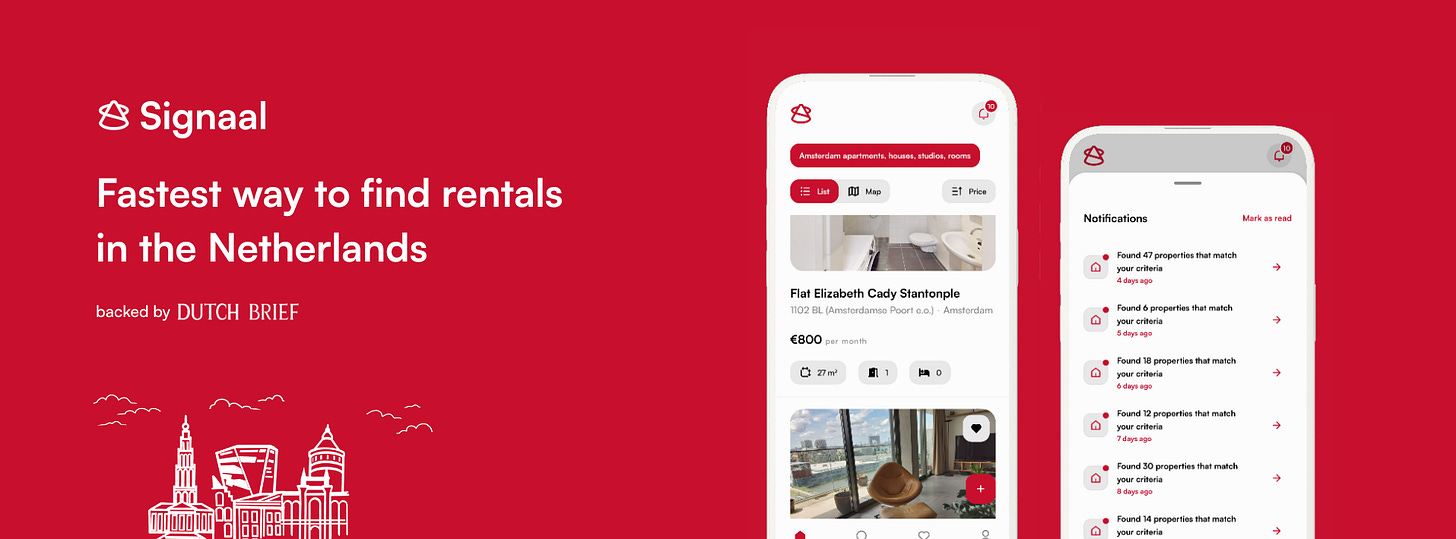The Complete Guide to Recycling and Waste in Groningen
What goes where, how to use containers, bulky-waste options, and simple habits that save time (and fines).
Before we begin, a quick shoutout to our sponsor, Signaal:
Looking for housing in the Netherlands?
Signaal helps you skip the endless scrolling by tracking new listings from trusted platforms and alerting you when something matches your needs, all in one easy-to-use app.
Just moved in? Groningen’s waste system is easy once you know the rules: which bin/container to use, how the underground containers work, and where bulky items go. Here’s the up-to-date, local guide.
Visual sorting guide: what goes where
Residual waste (“restafval”)
Most city addresses use underground containers opened with a waste card. In these areas, you can place plastics, cans, drink cartons, and even organic waste in the residual container: these are sorted separately at the regional sorting plant. Return deposit bottles/cans in the store. Don’t put electronics, batteries/paint, or construction waste here.
Paper & cardboard
Clean and dry only: newspapers, envelopes, boxes (flatten them). No coffee filters, wet/greasy paper, bubble-envelope mailers. Use street paper containers or kerbside collection where available (check your address).
Glass (“glasbak”)
Container glass like bottles and jars (lids OK). No ovenware/heat-resistant glass, drinking glasses, mirrors, or lightbulbs (bulbs = chemical waste). Use public glass containers across the city.
Textiles & shoes
Relatively clean textiles, even torn, plus pairs of shoes, belts, bags. No filthy/paint-stained items; no carpets (that’s bulky waste). Citywide textile containers are mapped; in the city centre, GoudGoed runs several pick-ups yearly.
Small chemical waste (“KCA”)
Batteries, paint, turpentine, medicines, lamp bulbs/fluorescent tubes. Hand in at waste stations, the chemokar (mobile drop-off) on scheduled rounds, or at participating shops (batteries/lamps). Check times in the waste guide/app.
Organic waste (GFT)
If you have an underground container address, you don’t need to separate organics: put them with residual and the plant will sort later. Where households have a green bio-bin, use that for food scraps/garden waste.
Using underground containers (and not getting fined)
Open with your “huisvuilpas” (waste card). New address and no card? Request one (replacement currently €21.90 if lost).
If a container is full or faulty: don’t leave bags beside it (fine risk). Take it to another container and report the issue; the city generally empties/fixes within ~24 hours.
Typical fines (municipal enforcement): placing waste next to a container, putting waste out too early, or offering incorrectly can lead to €110; littering on the street €170.
Find nearby containers on the official map.
Bulky waste (mattress, furniture, big items)
You have two options:
Bring it yourself to a waste station (Afvalbrengstation)
Addresses: Duinkerkenstraat 99 (Woldjerspoor) and Electronstraat 2 (Vinkhuizen); both open Mon–Fri 08:00–16:30, Sat 10:00–15:00. Bring your waste card and ID; follow on-site sorting.
Since 2023, the municipality requires a valid waste card to access bulky-waste sites.
Home pickup (paid) by the municipality
Book online or call 14 050. 2025 guide prices: up to 1.5 m³ = €54.46, 1.5–3 m³ = €77.73, 3–4.5 m³ = €104.96. Put items curbside 06:00–07:00 on pickup day; max 25 kg per item/bundle; size limits apply. Large electrical appliances can be collected free of charge—ask when booking.
Tools that save time (and trips)
Waste guide & app
Enter your postcode/house number in the Afvalkalender to see collection dates and chemokar rounds; use the official Afvalapp Groningen (Android) for reminders.Container map
Use the Afvalkaart to find glass, paper, textile and residual containers near you before you move in.Second-hand first
If furniture still has life, donate to GoudGoed/Mamamini or use their collection services; it’s cheaper and greener than disposal.
Simple habits that avoid fines (and headaches)
Flatten cardboard and take glass on your next supermarket trip (most glass banks are near shops).
Return deposit packaging (cans and plastic bottles) at supermarkets for your statiegeld back.
Book a pickup before moving out. Bulky items on the street without a booking can be fined/removed.
Report faults quickly; containers are normally serviced within a day.
Use your waste card, the app, and the sorting rules above, and you’ll keep your street tidy and your wallet fine-free. When in doubt, check the waste guide, map, or call 14 050.




